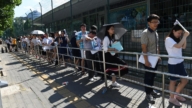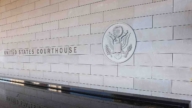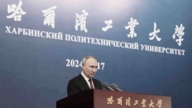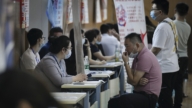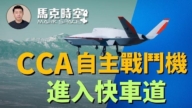【新唐人2012年5月21日讯】美国国防部周五发布的2012年度《涉华军事与安全发展报告》显示,中国去年的军费支出有可能达到1800亿美金,远远高于北京方面公布的数字。报告还指出:中国是世界上最大的经济间谍行动的策源地,并且通过网络攻击窃取情报。
中国今年3月份发布的数据表明,中国2012年的军费支出将达到6700亿人民币,也就是大约1060亿美金的规模。这与2011年相比增加了11.2%。到目前为止,中国军费支出在过去的20年中几乎每年都会以两位数的速度增长。
如果以2011年的价格以及汇率为准,美国国防部预测中国2011年度内的军费支出,实际上在1200亿到1800亿美元之间。美国国防部助理部长赫尔韦指出:“中国许多在核武器现代化方面的投资并没有出现在官方公布的预算中。另外美国猜测中国在国防工业上的许多研发费用也来自其他方面的预算,而且一些用于在国外采购的经费也来自别处。”
“纽约城市大学”政治学教授夏明指出,中共膨胀的军事开支源于它对内忧外患的焦虑和不安。中国现在在国际大的环境下,处境越发困难。因为中国在过去的十几年,在外交上逐渐的开始觉得财大气粗,逐渐变得更具有进攻性和侵略性,对周边小国采取了一些霸道的做法,对美国也采取更多强硬和挑战的做法。
夏明:“在这种心态下,和这种国际环境下,中国政府显然觉得加强军费军事开支成为必然的政策。因为从朝鲜半岛,到日本海,到黄海,到台湾海峡,到南海,到越南缅甸印度支那半岛,到南亚还有阿富汗,可以看到,中国处于他认为被敌对势力包围的环境。他的军费显然反映出他这样一种心态。”
其次,中共政府为了维护自己政权的合法性,它想从国际舞台上的地位来获得资源,加强国内的合法性。所以他扩张军备,使得武器不断现代化升级,成为威慑国内老百姓的一部分,成为加强合法性的一部分努力。
另外,中共军事膨胀跟其维稳路线和对内镇压民众的需要密不可分。
夏明:“因为中国目前在内部有很多让他头痛的地方,尤其在新疆和西藏,都是让他头痛的区域,所以军队的扩展和对内镇压是密不可分的。同时中国维稳集团成为中国一个庞大的利益集团,绑架了中国人民的利益。所以这个维稳集团显然从不断的扩张军事开支和维稳费用,夸大了武器和军事维稳人员的扩张对政权带来的积极效果,显然会引起这批利益集团不断扩张自己的利益,而把中国人民利益的绑架下去了。”
美国国防部助理部长赫尔韦再三提到网络攻击“来自中国”。他说:“我们对他们的了解越多,就越能够更好的明白他们行动的本质,并更有信心的说,许多网络攻击活动的源头是中国。”分析家们指出,中共利用间谍活动以及收购军民两用技术,来加速军事现代化的进程。
奥巴马总统去年推出新的军事战略计划核心政策,包括削减美军在世界许多其他地方的部署规模,但是加强美国在亚太地区影响。目标是建立一个可靠,廉价但足以抵抗恐怖主义危险的军事力量,同时要预防一些国家,例如中国和伊朗带来的新的危险。
采访编辑/秦雪 后制/李若琳
US Report: China, The World’s Top Active
Economic & Cyber Spy
On May 18, the U.S. Defense Department released the
latest annual report on “Military and Security Developments Involving the P.R.China”.
The report says China’s military spending in 2011 might
reach USD 180 billion, a figure much higher than the officially released figure. Chinese actors are the world’s most active and persistent
perpetrators of economic espionage.
The Chinese Communist Party (CCP) regime also launched
cyber attacks to gather intelligence, according to the Pentagon report.
The CCP official data release this March show that China’s
2012 military budget will reach 670 billion RMB (USD 106 billion), an11.2% increase over 2011.
Over the past 20 years, nearly each year has seen a
double-digit boost on its military budget.
Using 2011 prices and exchange rates, the U.S. Defense
Department’s estimates China’s total military-related
spending for 2011 ranges between $120 billion and
$180 billion,” said the report.
David Helvey, acting Deputy Assistant Secretary of
Defense said, “Some of their nuclear forces modernization
occurs off-budget, some of the R&D monies that go to their
defense industry we also think comes from a different budget.
some of the foreign acquisitions come from a different
account as well.”
Ming Xia, professor at the City University of New York, says,
China’s robust increase in military budget stems
From the CCP’s anxiety and unease beset by problems
inside and outside of China.
Under global circumstances, China is now facing an
increasinglydifficult situation, says professor Xia.
This is because after over a decades’ development,
the CCP began to feel rich and self assured.
Diplomatically, the regime has gradually shown itself
more offensive and aggressive.
It has taken some overbearing approaches to the
surrounding countries,and more tough and challenging stances against the U.S..
Ming Xia: “With such a mentality and in such a
global environment, the Chinese regime apparently believes that raising the military budget is a must.
From the Korean peninsula, to the Sea of Japan, down to
the Taiwan Strait and the South China Sea, until Vietnam,
Burma, India’s Indochina Peninsula,
South Asia and Afghanistan,
China is surrounded by ‘hostile forces’ that the regime defines.
Its military spending clearly reflects
such a state of mind. “
Secondly, the CCP military buildup aims to safeguard
the regime’s legitimacy by uplifting its role in the international arena.
Its military expansion and continuous weapons
modernization,serve to suppress the Chinese people and to strengthen the legality of it’s rule.
The CCP’s military expansion is inseparable from its
“stability preservation” policy and the repression of domestic civilians, says Ming Xia.
Ming Xia: “Inside China, there are lots of issues troubling
the CCP, especially in regions like Xinjiang and Tibet.
So military expansion is inseparable from internal repression.
Meanwhile, the ruling force advocating stability
preservation has become a large interest group in China.
Through continuous military expansion and
stability preservation,
this group has exaggerated the resulting positive effects on
the regime’s ruling power.
This has created excuses for the group to gain their
personal interests using this method,
but has also allowed them to abuse the interests
of the Chinese people. ”
David Helvey has repeatedly mentioned that cyber attacks
are found that “originate from China”.
“As we learn moreabout them, we have a better
understanding of the nature of the operations, and that
helps us to say with greater confidence that some of
these are in fact coming from China,”
Analysts said that espionage and the acquisition of dual-use
technologies could accelerate the Beijing regime’s military modernization.
In 2011, the Obama administration launched a new military
strategy.
The policy cuts U.S. military deployment in the world’s
other regions, strengthening its influence in the Asia-Pacific theatre.
The goal is to establish a reliable, uncostly military force
to resist the dangers of terrorism,
and to prevent new dangers originating from countries
such as China or Iran.




